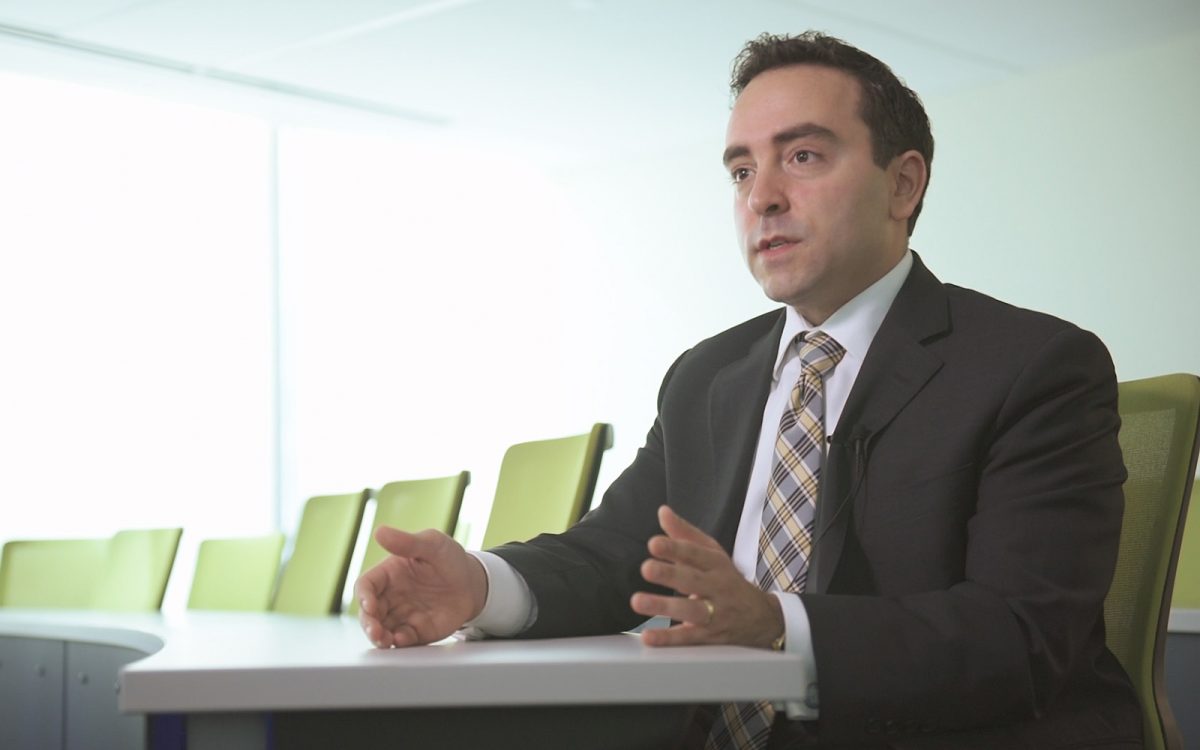UConn School of Business professor David Bergman won $2.5 million this week in a fantasy football competition by using some of the data analytics knowledge and techniques he teaches students.
“I’m just shocked by the whole thing, but it’s very exciting,’’ says Bergman, who has been a faculty member in the operations and information management (OPIM) department for seven years. “I’ve played fantasy sports since I was in college and it’s such a fun hobby.’’
Bergman won a DraftKings Daily Fantasy Sports World Championship last weekend, selecting an entry that edged out 199 others chosen by top-ranked challengers. Participants select a collection of nine NFL players and try to outscore the other opponents’ picks. Bergman says part of his success was in selecting three players outside the typical tournament favorites, allowing him to distinguish his entry and rise through the ranks.
“To me, it’s a very cool math problem,’’ says Bergman, who teaches graduate students in the MSBAPM and Ph.D. programs. “Top-ranked players might use a combination of game theory, predictive modeling, machine learning and optimization for selecting entries. Of course, on any particular day, you’re also flipping a coin; there’s always luck involved.’’
Fantasy sports competition is something in which the data analytics community is very interested, Bergman says. Other researchers in Bergman’s field recently published an article in Management Science, a top journal, titled, “How to Play Fantasy Sports Strategically (And Win).’’
More than 8 million people are registered users of DraftKings. Bergman competes in fantasy sports in his personal time away from work and using his own resources, but may find ways to build his recent experience into his teaching and research, as he has with other outside endeavors.
Bergman enjoys taking personal experiences and adapting them to generate research ideas. In the past few years, he has helped friends design seating recommendations for a non-profit organization that was hosting thousands for a major fundraising event at Yankees Stadium, and helped friends make seating arrangements for weddings, using data about guests’ interests to optimize seating plans. He and his colleagues have since published papers on the topic of seating problems.
He tells students that if they pursue a career as an analytics professional, they shouldn’t do it in a silo. Bergman, a lifelong football fan, urges them to pursue a domain that they’re knowledgeable in and excited about.
“There is no way to succeed in something like this without domain knowledge. You want to pursue an area you’re passionate about, and then have fun,’’ says Bergman, who teaches at both UConn Storrs and UConn Stamford.
Bergman excels in both research and teaching of data science and business analytics, and has published articles on data-driven optimization and sports analytics in top journals. “As a core teacher in the MSBAPM program, he brings his expertise to the classrooms and is well regarded by his students,’’ says Cuihong Li, OPIM department head.
Jose Cruz, associate dean of graduate programs in the School of Business, says Bergman’s winning is another feather in the cap for the School’s MSBAPM program.
“UConn’s graduate program in business analytics and project management delivers a cutting-edge, national Top 10 analytics program, led by world-renowned faculty and focusing on providing students real-word experience,” Cruz says. “The MSBAPM students are always participating in and winning industry data challenges across the country. David’s winning is just an example of what the MSBAPM curriculum prepares students to do.”
Although Bergman says he would have liked to go out to dinner to celebrate his victory, the pandemic kept his family at home. But it didn’t stop them from spreading the news.
“When I told my parents I’d won, they shared the news with everyone they know,’’ he says, laughing.
Bergman and his wife plan to tuck away some of his winnings for their children’s college funds and to donate generously to charity. They are contributors to charitable organizations in the area, including Hands on Hartford, which supports food, housing, and health in the capital city, and will write a bigger check this year.
“The prize money gives us more opportunity to do for others, but we are definitely also going to plan a trip to Disney World,’’ he says.



